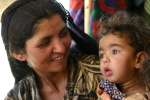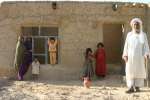Thousands still at Greek-FYR Macedonia border
News Stories, 4 December 2015
IDOMENI, Greece, Dec 4 (UNHCR) – Thousands of refugees and migrants were stuck at the border between Greece and the Former Yugoslav Republic of Macedonia on Friday following tense protests which prevented anyone from crossing for more than 24 hours.
By Friday morning, the chaos had calmed though passage through the border was far slower than usual. Only refugees and migrants from Syria, Afghanistan and Iraq are allowed to cross under restrictions implemented last month by authorities along the Western Balkans route.
Tensions have increased around along the Greek side of the border at Idomeni, since November 18, when FYR Macedonia started admitting only nationals from those three countries. Slovenia, Croatia and Serbia implemented similar screening systems by nationality.
On Thursday, UNHCR said it was deeply concerned about the tension and violence at the border between Greece and the Former Yugoslav Republic of Macedonia and called on the authorities of both countries to manage the border in a manner consistent with human rights and refugee-protection principles.
The UN Refugee Agency has also reiterated its concerns over the consequences of border restrictions currently implemented by several countries in the Balkans. UNHCR recommends profiling people based on their protection needs and not on their nationality.
More than 1,500 people from a wide variety of countries, including Iran, Morocco, Pakistan, Yemen, Bangladesh, Eritrea, Somalia, the Democratic Republic of Congo, have remained at Idomeni since the border restrictions where they have staged protests almost daily. Late last month, some 60 people went on hunger strikes and a group of 11 Iranian sewed their mouths shut in protest.
"As a result of restrictions by the authorities along the Western Balkans route to the admission of refugees and migrants from countries other than Syria, Afghanistan and Iraq, tensions have been rising at Idomeni, on the Greek side of the border, in recent days. These tensions have lead on several occasions to violence and a temporary closure of the border," UNHCR said in a press statement.
A group of the protesters -- mainly Iranians, Pakistanis, Moroccans and Bangladeshis -- blocked the border gate this Thursday (December 3). They shouted: "If we don't cross, no one does!"
Others threw stones. Greek police attempted to separate other people, especially those comprised of families with young children or elderly, into a nearby field for their protection.
A 22-year-old Moroccan man died by electrocution during Thursday's protests when he touched railway cables, according to Antonis Rigas, field coordinator for Médecins Sans Frontières (MSF).
"This tragic incident further underlies the need for the authorities to take appropriate action. We are calling on the Greek authorities to restore security as a matter of priority in order to ensure the protection of those in need and the safety of humanitarian workers and volunteers," UNHCR added in its statement.
The border crossing for refugees and migrants is located along rail lines connecting Greece and FYR Macedonia. Many of the stranded sleep in plastic tents near the tracks, unsure about their next steps.
Free daily buses back to Athens are available for refugees and migrants who have not been allowed to cross. There they can stay in reception centres and receive food, shelter and legal counselling by UNHCR staff and partner organizations.Others, particularly those of refugees with specific needs, such as women headed families, are staying in free apartments run by Praksis, a UNHCR partner NGO, as they await official relocation elsewhere in Europe.
By Tania Karas, Idomeni, Greece




















































